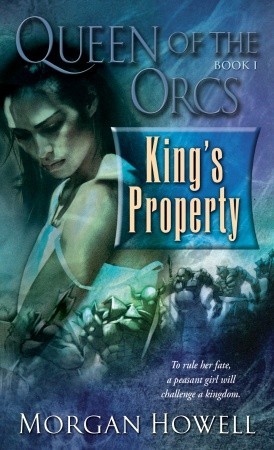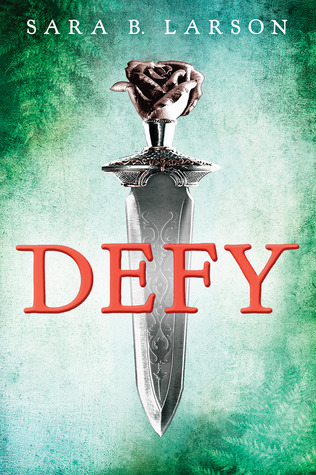This is the first book in a Trilogy called Queen of the Orcs, the title which sounds rather Spoilery right there.
 This isn’t a book review, per se, but consider yourself spoiled (warned) if you choose to keep reading.
This isn’t a book review, per se, but consider yourself spoiled (warned) if you choose to keep reading.
King’s Property would have been a fascinating read at any time, but as I had just shifted to a new main character within Lindorm’s cast (wanting someone with more inherent power to act and create change within the story), it was interesting to read about a powerless main character.
Dar is a branded slave, unable to escape because the brand meant she was worth more dead than alive. She allies herself with the fearsome Orcs she was recruited to serve, and displays her character through her willingness to adapt, and her compassion for those even weaker than herself.
I remember them from my own imaginations as a teenager: a pregnant woman then her newborn daughter. A young girl who needs mothering.
My gripe with this trilogy came when I got half way through the second book, Dar has fallen in love with one of her Orc friends.
No, that’s not the part I object to: if you don’t have a problem with Elf or djinn spouses, which I always rolled with up till now, there’s no reason to cry foul because the species is ugly. Their admirable character has already been established.
Being the way I am, I wanted to know if this was a ploy or a new cord to pull through the ending. (I’d gotten all three books from the library at the same time.)
Now, I should say, I gave this a bit of time. I recognized the elf/djinn fairness of letting her chose an orc, so I was riding it out to see what they did with this new arrangement.
In this world the Orc society was matriarchal the way the human society was patriarchal. That is to say, the person who held absolute power and the ultimate NO changed gender, but not inclination to wield it.
As yet this didn’t particularly bother me, and I even thought it was fairly well played, because there are benevolent patriarchies (though Dar had not experienced them) and a benevolent Matriarchy would be just as hierarchically-based.
But it started to wear on me, and my quick glance at the two-paragraph epilogue (where Dar happily embraces her daughters) was no longer enough to assure me this would end my kind of well.
I back tracked a few pages (in the end of the last book– yes. I’m that sort of a reader), and found where she brokenheartedly but firmly tells her lover that there’s no way they could live a meaningful life together (on the outskirts of Orc society) even if he was willing to be “invisible” with her. No one would want to marry their daughters, etc.
It struck me that the story opened with her being pulled ambivalently from her crap-sack family, and now were ending with her walking away from the new family she had, with great difficulty, built for herself.
After the blow-off-for-his-own-good, Dar then talks with the lover’s cousin about how there’s a quite-pretty orc that will make the rejected lover a fine wife, and he’ll be well taken care of, etc.
I was willing to see the rejection as a legitimate (if misdirected) effort to prevent their future children from rejection, but this last bit of conversation killed it for me.
You see, my measure of appropriateness in a ‘role reversal’ (such as this where females assume the lead/dominance normally attributed to males, or where whites are the minority rather than the default skin tone), is to flip it back around.
So in this case, I saw a Shane-like figure (as I disclaimer I’ve never read the book or seen the movie, I just know he leaves at the end) who graciously but firmly turns down the lovely, wispy blond he’s given marked attention to his whole time in town. He cites whatever reasonable reasons he has and tells her to go home to daddy.
Which she does, bravely hiding her tears as she walks away.
‘Shane’ then turns to her cousin, milking the cow and they proceed to talk about how some other good-looking guy’s been trying to get her attention all this time, and if she’ll just let him fix her broken heart everything will be hunky-dory.
Now, I don’t know about you, but I find both scenarios equally distasteful.
As it comes down to it, I really expected that, having been the bottom of the pile under the old system, Dar would have recognized the flawedness of such systems and tried to do something about it. And maybe she did in the beginning of the book-3 I didn’t read. The problem is that it didn’t last to the end.
She held all the power, and he was the good little male and did what his superior told him to do. Because she was higher than him, and he knew it was his job to submit.
I really liked Dar in the first book for her persistence and creativity in doing what she could to live the best life she could, but this ending felt like a type of giving up, and I was really disappointed.
Chose not to finish the trilogy, but I’d probably read the first book again.
Recommended for ages 17 and up:
General mistreatment and violence of both the sword and the sexual kinds. Not hugely graphic, but more than just hints at what’s going on.
 Fantasy and wish-fulfillment done well.
Fantasy and wish-fulfillment done well. Laugh-out-loud funny and emotionally relatable.
Laugh-out-loud funny and emotionally relatable. I thoroughly enjoyed
I thoroughly enjoyed  In this case I was very satisfied. The world created was genuine, motivations and goals were believable, and my connection to the characters drew me back to the story (so important in a long book) and let me disappear and recharge in the midst of a stressful time.
In this case I was very satisfied. The world created was genuine, motivations and goals were believable, and my connection to the characters drew me back to the story (so important in a long book) and let me disappear and recharge in the midst of a stressful time.